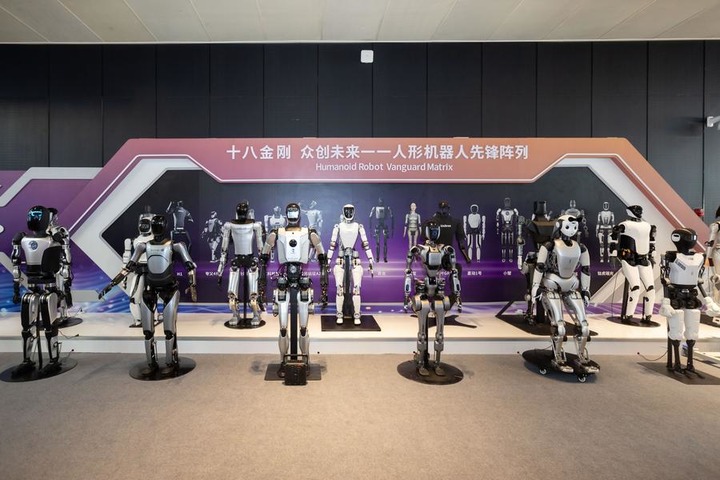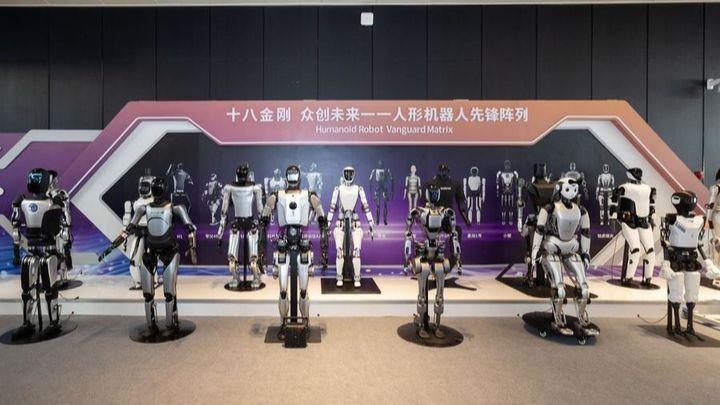
Humanoid robots are on display during the 2024 World AI Conference in Shanghai, east China, July 4, 2024. (Xinhua/Wang Xiang)
BEIJING, July 11 (Xinhua) -- The 2024 World Artificial Intelligence Conference and High-Level Meeting on Global AI Governance was held in Shanghai from July 4 to 6. Themed "Governing AI for Good and for All," the conference highlighted the latest industrial development, international exchanges and global governance of artificial intelligence (AI).
-- Emergence of AI-powered scenarios
China's AI industry has become a driving force for more and more industries and scenarios.
For traditional manufacturing industries such as steel industry, AI has been applied to improve efficiency of research and development (R&D), reduce failure rate and increase production.
In an exhibition hall of the conference, a lighthouse factory of CITIC Pacific Special Steel vividly showcased what happened in the blast furnace to the audience. With two lighthouse factories in place, AI has been in use in its 29 production bases in many countries around the globe, such as China, the United States, Morocco and Mexico, said Zhang Wenwu, general manager of CITIC Group.
China has cultivated 421 national-level smart manufacturing demonstration factories, with over 4,500 AI enterprises. The country ranks the second in the world in terms of computing power, said Shan Zhongde, vice minister of industry and information technology, during the conference.
More AI-powered industries are yet to come. In the exhibition hall of the conference, electric vertical takeoff and landing aircraft (eVTOL) can carry cargo or passengers, while Baidu ERNIE Bot, Shang Tang Ririxin and other large language models can "write poems".
Zhang Qingyuan, CEO of Kingsoft Office, said that the company is actively integrating leading large models in China into its products, to further promote office intelligence and provide infrastructure for high-quality development of various industries.
According to a report recently released by the World Intellectual Property Organization (WIPO), from 2014 to 2023, the number of patent applications for generative AI in China exceeded 38,000, ranking the first in the world.
-- Larger space for international exchanges
China's progress in AI has been shared across the world, bringing larger space for international exchanges.
The application of AI helps people overcome language barriers. For example, an AI-powered chat application "Talkie" can response in English and Japanese. An intelligent translation machine can help athletes communicate during international games, according to an AI-themed collection of cases released by the National Development and Reform Commission during the conference.
As a global leader in technologies, especially AI, China-developed technologies and applications have also benefited the world.
Kling, a text-to-video AI tool developed by the Kuaishou AI Team, went viral across the world. It empowers users with remarkable video generation capabilities, allowing them to effortlessly and efficiently create artistic videos. Technological innovation has greatly reduced the threshold of video content production, so that more creative people are no longer limited by equipment and cost, and can use creativity and imagination to produce video, according to the developer of the tool.
Apart from entertainment and social applications, there are other areas where technologies of China have been shared with other parts of the world that badly need them. The Fengwu meteorological model helps Belt and Road partner countries to predict weather changes. Thanks to the assistance of intelligent inspection drones, Brazilian wind turbine inspectors can now monitor substation equipment comfortably.
-- Governance for good, for all
The theme of this year's conference, "Governing AI for Good and for All," reveals the exceptional urgency of AI governance.
Since AI development is facing unprecedented challenges, especially security and ethics issues, global efforts and coordination are urged to unleash the potential of the novel technology and make it better serve global development and enhance human well-being.
Xue Lan, dean of the Institute for AI International Governance at Tsinghua University, proposed three major technological risks that may pose in the rapid development of AI, such as technological threats, data security, algorithm discrimination, and misuse and abuse of applications, urging more efforts from other nations to find the optimal solution together with China.
Besides, bridging the intelligence gap is a key priority to promote inclusive development.
According to a related report, about one-third of the global population, or 2.6 billion people, remained offline in 2023. The global community needs to do more to help developing nations catch up, accelerate digital adoption, and ensure that everyone can reap the benefits.
China launched the Global AI Governance Initiative and proposed a resolution at the 78th UN General Assembly to enhance international cooperation on AI capacity building, which was unanimously adopted.
The country has once again reaffirmed its commitment by issuing the Shanghai Declaration on Global AI Governance during the 2024 World Artificial Intelligence Conference, with focuses on the development, security, governance and public participation and literacy of AI.
(Edited by Li Shimeng with Xinhua Silk Road, lishimeng@xinhua.org)




 A single purchase
A single purchase









